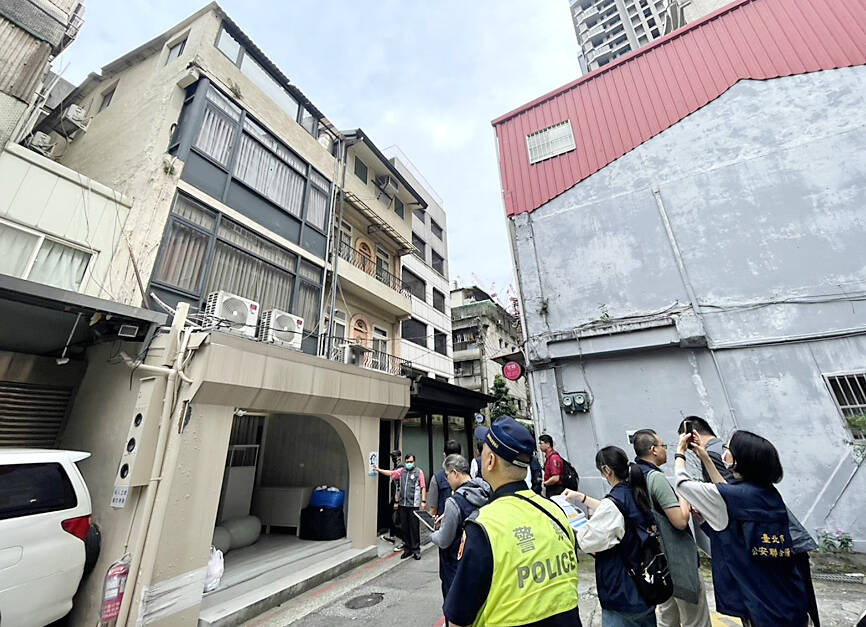The Ministry of Transportation and Communications is to tighten regulations on unlicensed hostels and hotels in September, officials said yesterday as they previewed the new rules.
The amendments to the Act for the Development of Tourism (發展觀光條例) would increase penalties for tourism and hospitality establishments that fail to meet standards or operate without a permit, the ministry wrote in the preview.
These changes aim to strengthen market order and enhance consumer protections, the ministry stated.

Photo courtesy of Taipei Department of Information and Tourism
Tourism industry businesses that fail to meet legal standards would be required to rectify any issues identified by officials or face a maximum fine of NT$300,000 (US$10,202), up from the current NT$150,000, it said.
In cases of noncompliance or threats to consumer safety, the business license of an entity could be revoked, it added.
Unlicensed tour agencies and hotels would face a maximum fine of NT$2 million, up from the current NT$500,000, it said.
Hostels operating without a permit could be fined between NT$100,000 and NT$1 million, an increase from the current range of NT$60,000 to NT$300,000, the ministry said.
Advertising a business without a valid operating license would become an offense, punishable by a fine of NT$100,000 to NT$1.5 million, up from NT$30,000 to NT$300,000, it said, adding that companies in breach of the provision would be required to remove the advertisement, and failure to comply could result in additional fines.
Tour agencies without insurance to cover potential failure to fulfill their contractual obligations would be suspended, and would be required to correct the issue within three months or face a fine ranging from NT$30,000 to NT$500,000, the ministry said.
The public comment period for the new regulations would remain open for 60 days, beginning from yesterday’s announcement, the ministry said.
Meanwhile, 1,637 illegal accommodations nationwide were fined a combined NT$54.83 million in the first half of this year, Tourism Administration data showed.
Taipei had the highest number of illegal accommodations, with 268 cases — 31.49 percent of all its accommodations — and the city imposed NT$13.92 million in fines, also the highest in the nation.
From January to last month, there were 3,291 legal hotels and 12,351 legal homestays nationwide, an increase of 28 and a decrease of 482 respectively, compared with the same period last year, the data showed.
The number of illegal hotels stood at 1,061 and illegal homestays at 565, both lower than last year.
A total of 8,725 inspections were carried out nationwide, resulting in 673 penalties and NT$54.83 million in fines, the data showed.
In Taipei, inspections found 583 legal accommodations and 268 illegal ones, the highest in absolute numbers in and the proportion of illegal to legal accommodations, it showed.
In Taichung, 502 legal accommodations and 222 illegal ones were inspected, placing third in the number of illegal cases, but second in proportion.
Yilan ranked third in proportion, with 223 illegal accommodations out of 2,430 legal ones, or 8.4 percent.
Kaohsiung had 528 legal accommodations and 118 illegal ones, with illegal accommodations accounting for 18.26 percent.
Additional reporting by Tsai Yun-jung and Lery Hiciano

The Coast Guard Administration (CGA) yesterday said it had deployed patrol vessels to expel a China Coast Guard ship and a Chinese fishing boat near Pratas Island (Dongsha Island, 東沙群島) in the South China Sea. The China Coast Guard vessel was 28 nautical miles (52km) northeast of Pratas at 6:15am on Thursday, approaching the island’s restricted waters, which extend 24 nautical miles from its shoreline, the CGA’s Dongsha-Nansha Branch said in a statement. The Tainan, a 2,000-tonne cutter, was deployed by the CGA to shadow the Chinese ship, which left the area at 2:39pm on Friday, the statement said. At 6:31pm on Friday,

The Chinese People’s Liberation Army Navy’s (PLAN) third aircraft carrier, the Fujian, would pose a steep challenge to Taiwan’s ability to defend itself against a full-scale invasion, a defense expert said yesterday. Institute of National Defense and Security Research analyst Chieh Chung (揭仲) made the comment hours after the PLAN confirmed the carrier recently passed through the Taiwan Strait to conduct “scientific research tests and training missions” in the South China Sea. China has two carriers in operation — the Liaoning and the Shandong — with the Fujian undergoing sea trials. Although the PLAN needs time to train the Fujian’s air wing and

The American Institute in Taiwan (AIT) put Taiwan in danger, Ma Ying-jeou Foundation director Hsiao Hsu-tsen (蕭旭岑) said yesterday, hours after the de facto US embassy said that Beijing had misinterpreted World War II-era documents to isolate Taiwan. The AIT’s comments harmed the Republic of China’s (ROC) national interests and contradicted a part of the “six assurances” stipulating that the US would not change its official position on Taiwan’s sovereignty, Hsiao said. The “six assurances,” which were given by then-US president Ronald Reagan to Taiwan in 1982, say that Washington would not set a date for ending arm sales to Taiwan, consult

A Taiwanese academic yesterday said that Chinese Ambassador to Denmark Wang Xuefeng (王雪峰) disrespected Denmark and Japan when he earlier this year allegedly asked Japan’s embassy to make Taiwan’s representatives leave an event in Copenhagen. The Danish-language Berlingske on Sunday reported the incident in an article with the headline “The emperor’s birthday ended in drama in Copenhagen: More conflict may be on the way between Denmark and China.” It said that on Feb. 26, the Japanese embassy in Denmark held an event for Japanese Emperor Naruhito’s birthday, with about 200 guests in attendance, including representatives from Taiwan. After addressing the Japanese hosts, Wang